calsfoundation@cals.org
Benjamin Marcus Bogard (1868–1951)
Benjamin Marcus Bogard, founder and head of the American Baptist Association, was Arkansas’s leading fundamentalist Christian in the 1920s. In 1928, his efforts resulted in a law banning the teaching of evolution in Arkansas public schools; it remained in place until 1968, when the U.S. Supreme Court overturned it.
Bogard was born on March 9, 1868, in Hardin County, Kentucky. He was the only son of tobacco tenant farmers M. L. and Nancy Bogard; the couple also had five daughters. In 1873, the Bogards moved to Caseyville, Kentucky, where Bogard attended school, Woodland Baptist Church, and evangelical camp meetings. In February 1885, he was baptized in an ice-covered pond during a church service.
In 1887 and 1888, he attended Georgetown College in Kentucky. In 1887, he was ordained as a Baptist minister and began a two-year education at Bethel College in Russellville, Kentucky; sources do not indicate whether he graduated. In 1891, he married Lynn Oneida Meacham Owen, a widow with a daughter. They had a son, Douglas. From 1892 to 1898, Bogard served as pastor of several churches in Kentucky and Missouri. In 1901, he received an honorary doctor of divinity degree from Southwest Bible College in Bolivar, Missouri. Later, he received an honorary doctor of law degree from Missionary Baptist College in Sheridan (Grant County).
In 1895, Bogard met John Newton Hall of Fulton, Kentucky, a leader of the Landmark Baptist movement, which emphasized certain “landmarks” in the Bible, including a literal interpretation. Bogard embraced the Landmark faith, defending it through public debates and writing. In 1901, he became half-owner and editor of the Arkansas Baptist, gaining full editorial control in 1904. He left the Southern Baptist Convention in 1905 and later formed the American Baptist Association, commonly called Missionary Baptists.
Bogard came to Arkansas in 1899 as pastor of First Baptist Church in Searcy (White County), serving until November 1903. At various times from December 1903 to 1909, he was pastor of First Baptist Church in Argenta, now North Little Rock (Pulaski County). Then he became an itinerant minister, conducting evangelical revivals in seven states. He moved to Texarkana (Miller County) in 1914 and founded the Baptist Commoner, which merged with the Arkansas Baptist in 1917 to form the Baptist and Commoner. In 1920, he became pastor of Antioch Missionary Baptist Church in Little Rock (Pulaski County), where he remained until he retired in 1947.
In the 1920s, Bogard was a member of the nativist and anti-Catholic Ku Klux Klan. He joined other fundamentalist Christians in attacking the theory of evolution as the cause of moral decline in the country. In 1926, he and Doss Nathan (D. N.) Jackson wrote Evolution: Unscientific and Unscriptural, which linked evolution, atheism, and Bolshevism to moral decline.
When the state Senate tabled an anti-evolution bill in 1927, Bogard organized a petition drive that resulted in the measure’s being placed on the November 1928 ballot as Initiated Act 1. Over several months, Bogard waged a no-holds-barred war with the act’s opponents. A bizarre campaign included his defense of the right to free speech of Charles Smith, president of the American Association for the Advancement of Atheism and an opponent of the act; Little Rock (Pulaski County) police had arrested Smith as a public nuisance. A former Arkansan headquartered in New York City, Smith had been scheduled to debate national fundamentalist leader William Bell Riley of Minnesota. Bogard welcomed the atheist’s presence because it linked atheism and evolution. He believed in the marketplace of ideas and was confident that the best idea—in his mind, a literal understanding of biblical creation—would triumph. Voters passed the anti-evolution act by a two-to-one margin.
Also in 1928, Bogard joined other conservative Protestant ministers to form the Anti-Smith Democrats, opposing Catholic Democratic presidential candidate Alfred E. Smith of New York. Bogard warned that Smith would overturn Prohibition and make the United States subject to the pope, resulting in the bloody suppression of American Protestants. He also said Smith would impose “Negro equality” on the segregated South. Nevertheless, Smith, whose running mate was Senator Joseph T. Robinson of Arkansas, received a majority of votes in the state despite losing the election.
Bogard resigned as editor of the Baptist and Commoner in 1931 after a dispute with its owner. In 1934, he started the Orthodox Baptist Searchlight newspaper and founded Missionary Baptist Seminary in Little Rock. In 1937, the Missionary Baptist Sunday School Committee reported a deficit. Bogard mounted a decade-long campaign against the committee’s chairman, the father-in-law of former collaborator D. N. Jackson, who in 1950 left the denomination.
Bogard died on May 29, 1951, at his home in Little Rock. He is buried at Roselawn Cemetery. A prolific author and a pioneer of radio evangelism, he was honored by Ripley’s Believe it or Not for preaching “every Sunday for 61 years without missing a single Sunday.”
For additional information:
Barber, Christopher Bart. “The Bogard Schism: An Arkansas Baptist Agrarian Revolt.” PhD dissertation, Southwestern Baptist Theological Seminary, 2006.
Foreman, L. D., and Alta Payne, eds. The Life and Works of Benjamin Marcus Bogard. Little Rock: Foreman and Payne, 1966.
Lewis, Todd E. “Ben Bogard and the Crusade against Evolution, Rum and Romanism in Arkansas, 1926–1928.” MA thesis, University of Arkansas, 1989.
Pratt, J. Kristian. The Father of Modern Landmarkism: The Life of Ben M. Bogard. Macon, GA: Mercer University Press, 2013.
Todd E. Lewis
University of Arkansas, Fayetteville
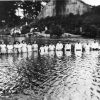
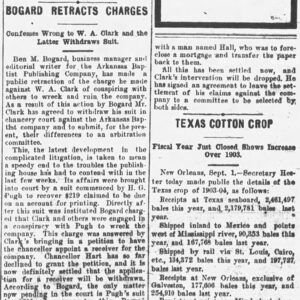
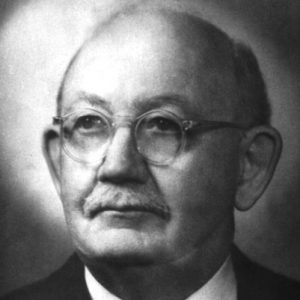
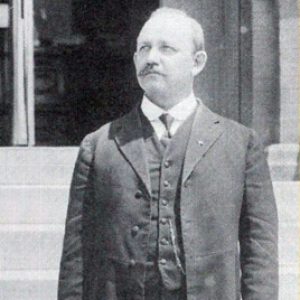
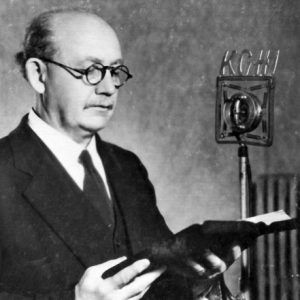
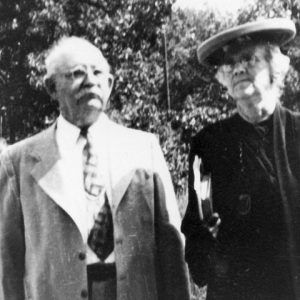




Comments
No comments on this entry yet.